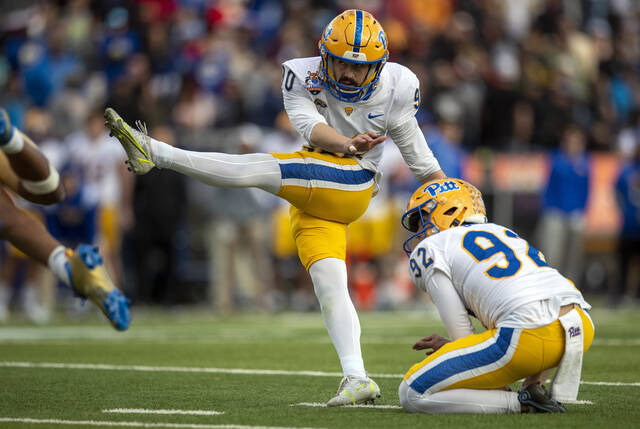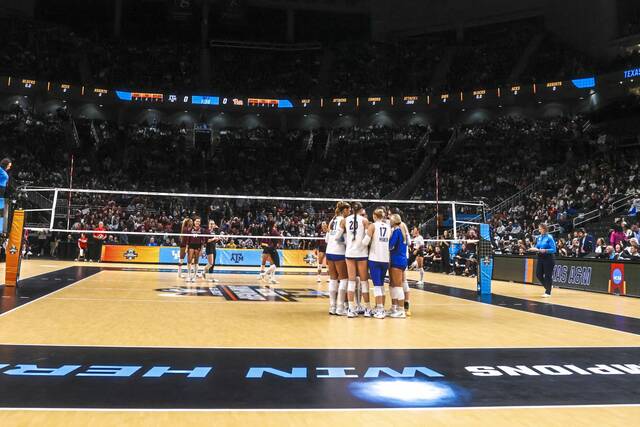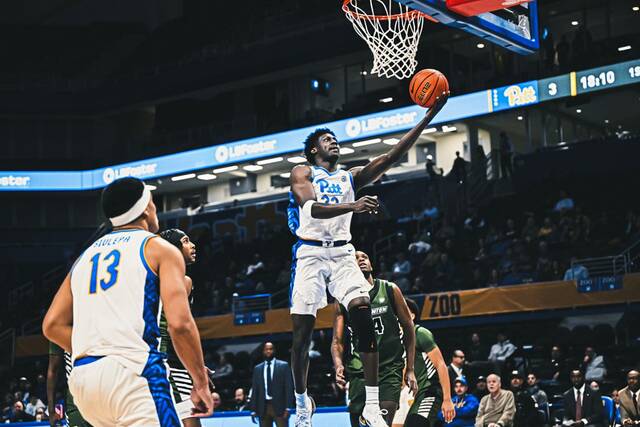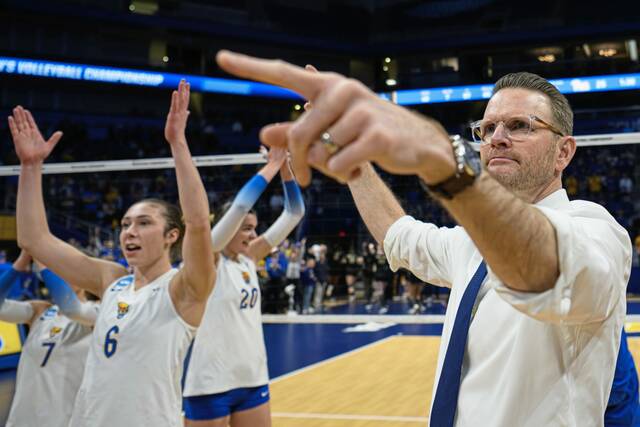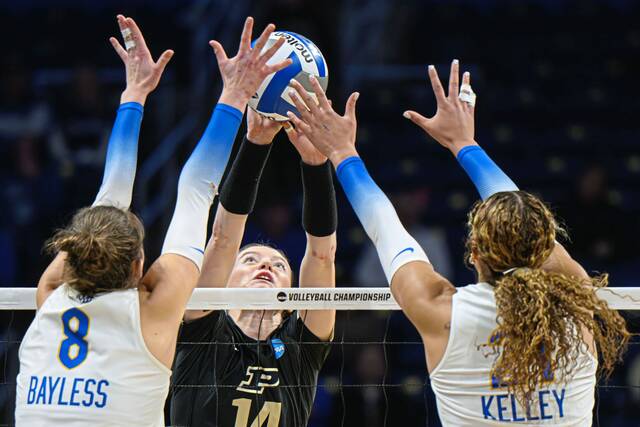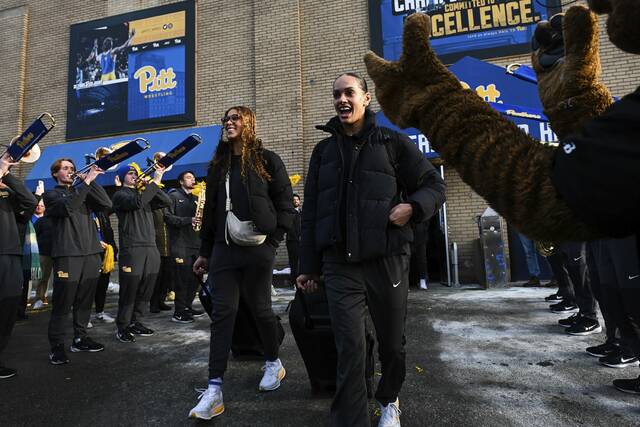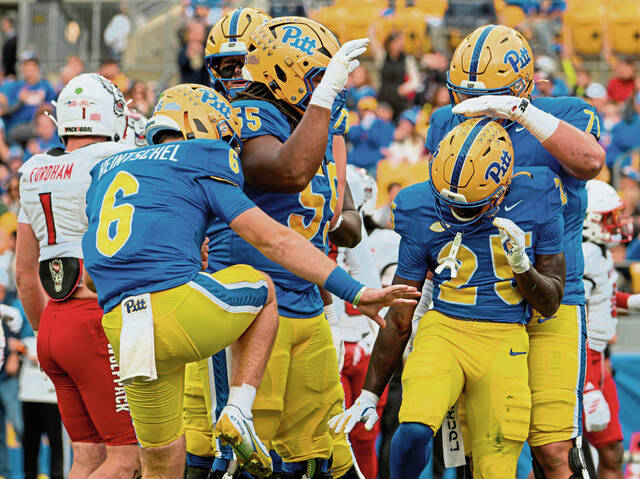The noise level around Pitt football eventually will rise.
The stakes will get higher.
Coaches’ shouts will pierce players’ ears and enter their brains daily through the end of November. Maybe longer, if they’re lucky.
Amidst the chaos, two Pitt football players have found a way to handle the intensity of training camp and the 12-game regular season.
Kicker Ben Sauls shuts his eyes and just thinks.
Quarterback Nate Yarnell clears his head and lets his 10 fingers glide musically across 88 keys.
Here are their stories, and three others from the first days of summer camp:
1. The Thinker
When he was asked to identify his goals for the season, Sauls had no intention of bragging. He just states in a matter-of-fact manner, “I think I can be the best in college football. So that’s the goal.”
How does he plan to achieve that lofty aspiration.
“Repetition,” he said. “That always helps. That’s pretty basic.”
That’s only part of it.
”I like to meditate,” he said.
Sauls, who holds a bachelor’s degree in economics from Pitt, said kicking is mostly mental.
“I don’t think it’s a talent issue whatsoever,” he said. “I don’t think there is an issue. I think my misses go into a mental aspect of it, instead of the physical and the ability to do it.”
Sauls, 23, said he tries to meditate daily a minimum of every other day for 10 to 20 minutes at a time.
“Shut your eyes and kind of ground yourself,” he said. “Be where you’re at. I think … I can bring that attitude here, just be where your feet are and take everything one moment at a time, one kick at a time.
“I like to seclude myself. Nice, quiet scenery is usually nice. Totally quiet. When I really got into it, I said, ‘That’s a little odd.’ Once you keep doing it and doing it and doing it, you’re actually training your brain in certain ways. I can’t break down the science of it, but even if it’s placebo, it’s worked for me.”
While meditating, he visualizes certain kicking techniques such as his steps toward the ball, hitting it and following through and even the height of his head at the moment of impact. “Be very process-oriented,” he said.
“I’ll put myself in a game-day situation, a game-day moment. I’ll go through the repetitions in a game. That way there’s nothing that can surprise me. I’ll put myself in a rep that happened a couple days ago just, so I can see what happened and what went wrong or right, good or bad. You can always learn from it.”
He learned meditation from his predecessor at Pitt, kicker Alex Kessman, and a sports psychologist.
Sauls has made all 75 of his extra-point attempts the past two seasons, plus 31 of 40 field goal tries (17 of 19 inside the 40-yard line).
He said his range is “comfortably 60.”
“We were messing around the other day, hit from 65. If need be, say we got a little breeze, 65-66, we’ll get it done.”
2. Keys to victory?
Yarnell started playing the piano in seventh grade at home in Austin, Texas.
“Started it, enjoyed it, loved it,” he said. “I took only about two years of lessons. At that point, I just started playing on my own.”
There’s a piano in Pitt’s practice facility, but the demands of being QB1 limit his keyboard surfing.
“I definitely wish I played more,” he said. “I need to get one (at home).”
Yarnell, 21, likes to play the night before a game if he can find a piano in the team hotel.
“It helps me sleep. and when I wake up, it’s time to go,” he said. “It’s relaxing.
“I just don’t think about anything else when I’m playing. That’s the biggest thing, calming your mind, being in the moment.”
Great composure, great composer. @NateYarnell orchestrated a great team win. Calm and cool earlier this morning too! 1-0 #WEnotME #H2P pic.twitter.com/YuXAc4vtD1
— Pat Narduzzi (@CoachDuzzPittFB) September 18, 2022
Yarnell said he likes to play classical music. One of his favorites is Beethoven’s “Moonlight Sonata.” He was caught playing it the morning of the Western Michigan game in 2022 before he went out and orchestrated a 34-13 victory. But he also likes “Hotel California” and “Year of the Cat.”
3. ‘A powerful dude’
Offensive coordinator Kade Bell got a little carried away in front of reporters when he said running back Desmond Reid can squat 600 pounds in the weight room.
Told of his coach’s boast, Reid corrected him by 100 pounds. He said 500 is his best so far.
Nonetheless, the 5-foot-8, 175-pound junior from Western Carolina will be a big part of Pitt’s offense this season.
Considering his stature, there were questions about Reid’s effectiveness in pass protection until one day this spring.
“First day of blitz pickup,” Bell said, “he hit our 230-pound Mike (linebacker) right in the mouth. He’s a powerful dude.”
Added Reid: “I can do what other backs can do who are bigger than me. I play with a lot of heart. That’s going to separate me from other backs.”
4. Speed, speed, speed
Backup quarterback Eli Holstein explained how fast the offense might go this season at its optimal speed.
“As soon as I throw the ball and see somebody catch it, I have to look to the sideline to get the signal for the next play,” he said. “We’re trying to line up with 30-35 seconds left on the play clock.”
That’s fast, considering the play clock in college football is 40 seconds, and it usually starts 3 seconds after the end of the play.
Holstein, who transferred from Alabama, comes from Zachary, La. He said there is little more there than Main Street, a Walmart and Zachary High School football, where he threw for 7,014 yards and 62 touchdowns in three seasons.
How did he end up in the big city?
“Coach Bell really sold me on how I fit in this offense,” he said. “New opportunity, new chance, kind of a fresh start. Coming out of high school, I definitely didn’t think I would go anywhere above the Mason Dixon Line. Here I am.”
5. ‘Missed opportunities’
Every defensive coach on every team across the U.S. emphasizes the importance of turnovers. Pitt had only 16 last season, an average of little more than one per game (10 interceptions, six fumble recoveries). That’s one reason for the 3-9 record.
Assistant head coach Cory Sanders, who coaches the safeties, said he tells his players all the time: “We have to make more plays.”
“They’re around the football. They’re in great position,” Sanders said. “Javon (McIntyre) should have had three more interceptions last year. Donovan (McMillon) should have had two. Donovan had one on the field (Wednesday) that went through his hands. He ended up tipping it. (Cornerback) Rashad Battle made a great interception.
“We have to come away with those opportunities when they present themselves. We had too many missed opportunities with that last year.”


